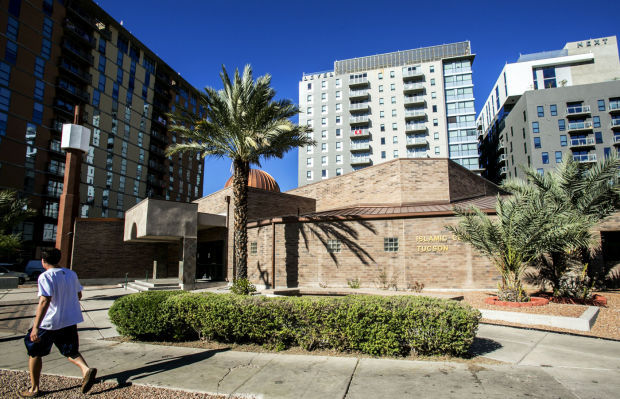Three women will join the Islamic Center of Tucson’s highest governing board for the first time.
While women have often served on the center’s executive committee and board of education, Hala Tyree, Ismat A. Shafiqullah and Rania Kanawati will give women an unprecedented voice on the seven-member board of trustees.
“It shows that the community sees women’s roles and representation are needed, so that we can voice and achieve women’s goals and requests,” said Tyree, 55, who has attended the Islamic Center, 901 E. First St., with her family for 15 years. She also serves as secretary on the board of education.
The board of trustees is responsible for “whatever issues the community faces,” said Kamel Didan, the vice chairman of the outgoing board. This can include personnel decisions, financial planning and community involvement.
About 30 people were nominated for the three-year position, said Ahmed Meiloud, the chair of the election committee. Board members must be members of the Islamic Center, receive at least two nominations from other members and accept their nomination. If more than seven nominees accept, the center holds an election among members, an unnecessary step this time around.
The all-new board announced Friday represents another transition for the center, which welcomed a new imam at the end of last year, after a series of temporary leaders.
“No matter how fair and just and representative we try to be, there will be a missing touch with half the community not being fully represented,” Didan said. “The mosque traditionally caters to men, and for the most part men are in the forefront, but now they are bringing in ladies ... and I hope it will become a tradition.”
The leadership transition comes at a time when the center is considering expanding and remodeling, whether on campus or elsewhere. The women on the new board want to ensure that their sisters are considered.
“We are looking at expansion, so we want to have our voice in the plans in what it will look like for women to have more space,” Tyree said.
Kanawati has attended the center for about 10 years and teaches Arabic at the Al-Huda Islamic School. She said the lack of space for child care is another issue.
“We pray during the kids playing, and sometimes we don’t hear anything,” said Kanawati, the 43-year-old chair of the center’s board of education.
For most of the year, men and women pray in separate spaces. During Ramadan in particular, women pray in an area connected to the main prayer room, with the space made distinct by a sliding curtain. Some prefer it open, others do not.
“We have big TV monitors and we can see the imam, and we don’t want to mess with that setup,” Shafiqullah, 71, said of the women’s prayer space. They can also see through a window between the rooms. “As it is, we don’t have enough room for the men, so sometimes it overflows.”
Shafiqullah has been “behind-the-scenes” at the center since her husband became one of the founding members of the mosque in the early 1970s, but she calls herself a “troublemaker.” She likes to see the imam and keep the curtain open.
“It’s nice to see the whole congregation,” she said. “You feel like you’re part of it.”
For now, staying out of the main prayer room during crowded services is an issue of respect and space, Shafiqullah said. The diversity of the center also means some members come from more traditional backgrounds, including women who prefer to pray in a separate space.
“Some men would freak out if they saw us, these heavenly beauties floating there,” Shafiqullah joked. “I respect that.”
In the past, the board has responded favorably when she has brought the requests of the center’s women to its attention. Now, though, there will be a more direct female voice.
“Most women have so many challenges when they come to the U.S.,” Kanawati said. She noted that many at the Islamic Center move to Tucson from other countries. That can make caring for a family and communicating difficult. “If you don’t have a connection in the ICT, you are lost.”





